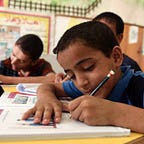Empowering Sudan: Reshaping a nation through solar transformation
By Dr Selva Ramachandran, UNDP Sudan Resident Representative
Having undergone a once in a lifetime revolution, Sudan has a unique opportunity to reshape its future. But, the economic, security and development challenges it faces are significant.
Nowhere is this more notable than the confluence of energy, poverty, and agriculture.
65 percent of Sudan’s 41.8 million people live in rural areas, with incomes dependent on agriculture or livestock. But, more than one million farms rely on polluting, costly and often unavailable fossil fuels to operate energy-intensive technologies, like water pumps, for irrigation.
Meanwhile, Sudan spent one billion dollars of its limited foreign exchange resources importing diesel in 2019, 60 percent of the population lack access to electricity, around 21 percent of the population are facing crisis levels of food insecurity, and poverty is endemic.
A shift to clean energy, particularly distributed renewable energy solutions like solar, offers a way to address many problems simultaneously, unlocking Sudan’s agricultural potential and rural development. Doing so will improve living standards, help reduce poverty and address gender disparities. Facing COVID-19’s socio-economic impacts these needs are more critical than ever.
For the last five years, the United Nations Development Programme (UNDP) in Sudan has focused on solar technology as a tool for poverty alleviation and development.
With our partners and the Government, we have brought solar electrification to 70 villages in Darfur and powered 464 community services centers including schools, health centers and rural hospitals, among other efforts, assisting hundreds of thousands.
Our solar-powered irrigated agriculture pilot in Sudan’s Sahara-encompassed Northern State underscored this — productivity and land use increased by almost 50 percent, higher value crops like watermelon and mango were introduced, while fuel costs, and crop loss due to unpredictable fuel shortages, were eliminated.
But, these efforts fall short of the nationwide solar transformation that Sudan so urgently needs.
In a UNDP programme concept targeting Sudan’s most vulnerable, 150 health clinics, 20,000 farming irrigation pumps, 1,000 clean-water providing water yards, and 50 rural commercial mini-grids could ‘go solar’. Doing so via a pooled fund could improve the lives of at least 6 million people directly and indirectly in the near future.
The benefits of such a transformation are evident: quality of and access to health services, improved livelihoods, resilience and productivity in agriculture, reduced pressure on foreign exchange reserves and public finances via fuel subsidy reductions, and reduced carbon emissions and air pollution.
Such a shift brings significant gender benefits, as poor women, particularly in female-headed households, spend a great deal more time than male counterparts on energy-related activities such as firewood gathering, water fetching, and cooking.
In short, access to sustainable and affordable energy is a key requirement for Sudan’s development. Until this is addressed, limited access to energy will remain a significant contributor to persistent poverty.
The primary barrier is access to finance, but it must be innovative. At a country level, the solution is a ‘National Solar Fund’ — pooling funds from national banks, Federal and state-level governments, UNDP and international donors to ensure solar technology loans are commercially viable. Such a fund will ensure farmers, communities, and households can access subsidized, low-cost loans to invest in solar technology and bridge their financial gap.
Globally, Sudan is benefitting from support by the Climate Investment Platform (CIP), a new initiative to facilitate access to climate finance for high-impact projects. In the Sudan context, the CIP is bringing in innovative private sector business models for solar and tapping the CIP’s network of potential investors and donor institutions.
With financing in place comes de-risking and delivery — outlined in a recent UNDP report Empowering Sudan: Renewable Energy Addressing Poverty & Development — with critical steps already taken, like the launch of Sudan’s first ‘Solar Lab’ in July.
Between the Global Environmental Facility, UNDP, the Government of Sudan, the Korea International Cooperation Agency, the African Development Bank and other organizations, thousands of solar pumps are planned for roll out to farms across four states. Trials will begin shortly with solar-powered tuk tuks, and the construction of Sudan’s first 1 MW grid-connected wind turbine is underway.
But again, the above are initiatives and projects — not nationwide solutions like the National Solar Fund. Facing economic, food insecurity, energy poverty and other development challenges, Africa’s third-largest country must reduce its reliance on fossil fuels and unlock its agricultural potential. Only then can Sudan achieve widescale, inclusive development.
Government and public interest for renewable alternatives is high but cannot be achieved without support from the international community.
Departing Sudan after five years, I know renewable energy is the solution Sudan needs. It won’t solve every problem, but it offers a unique and powerful opportunity to transform and empower a country that so greatly deserves it, and build forward better post-COVID-19.
To learn more about UNDP’s renewable energy efforts in Sudan:
